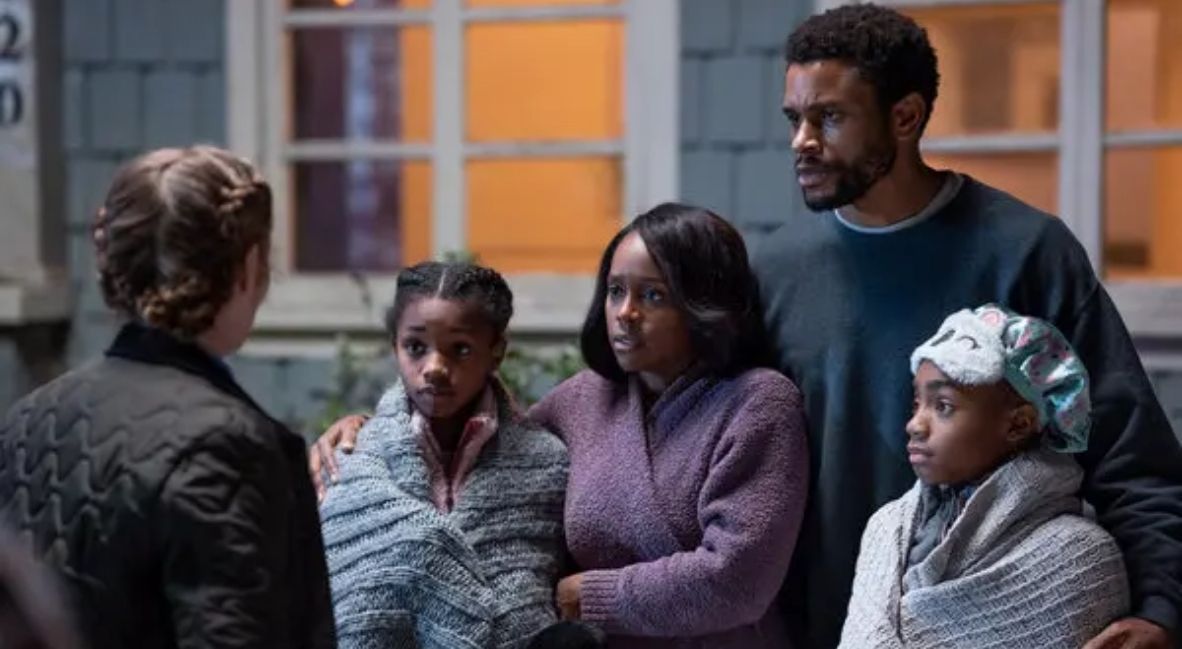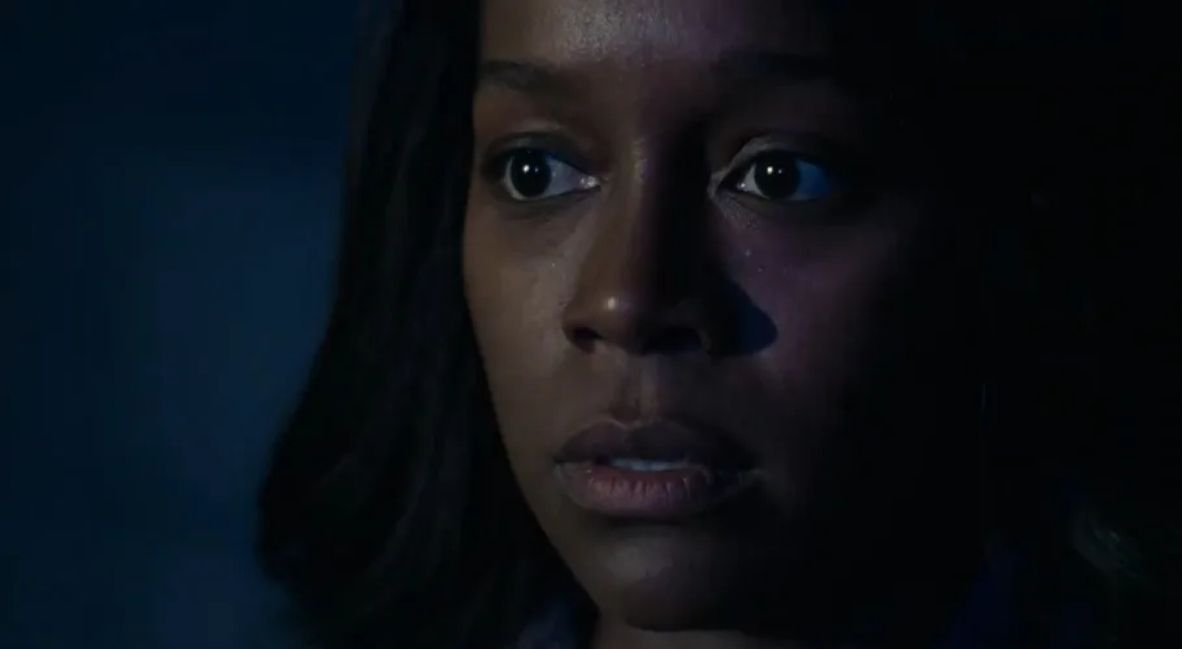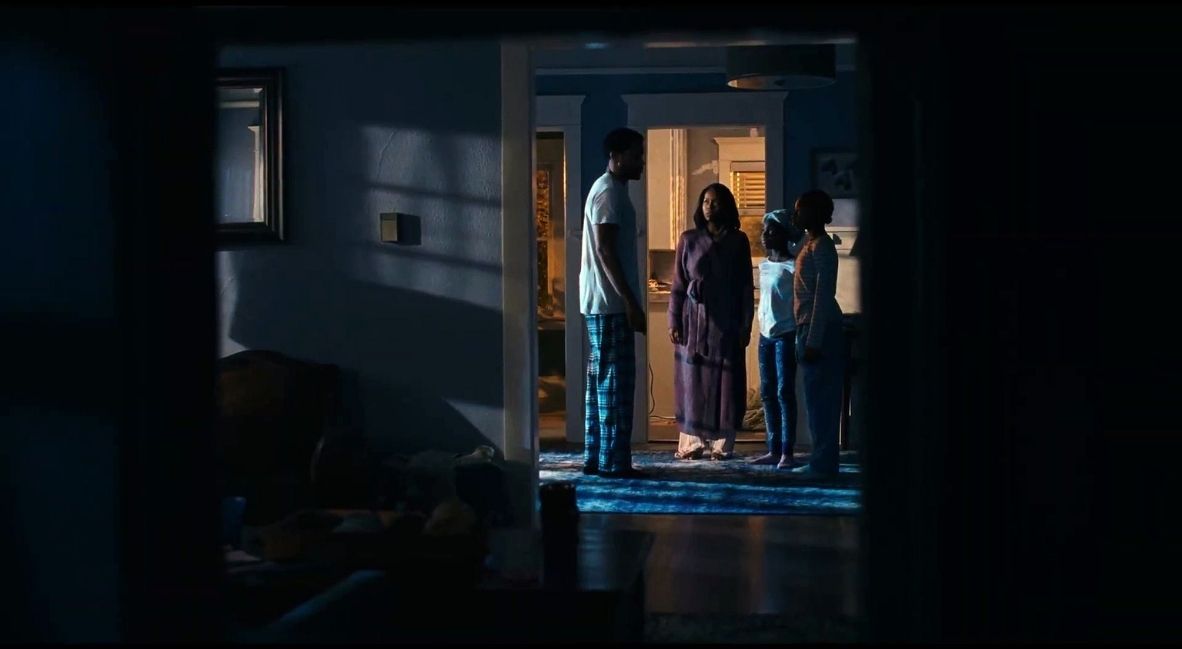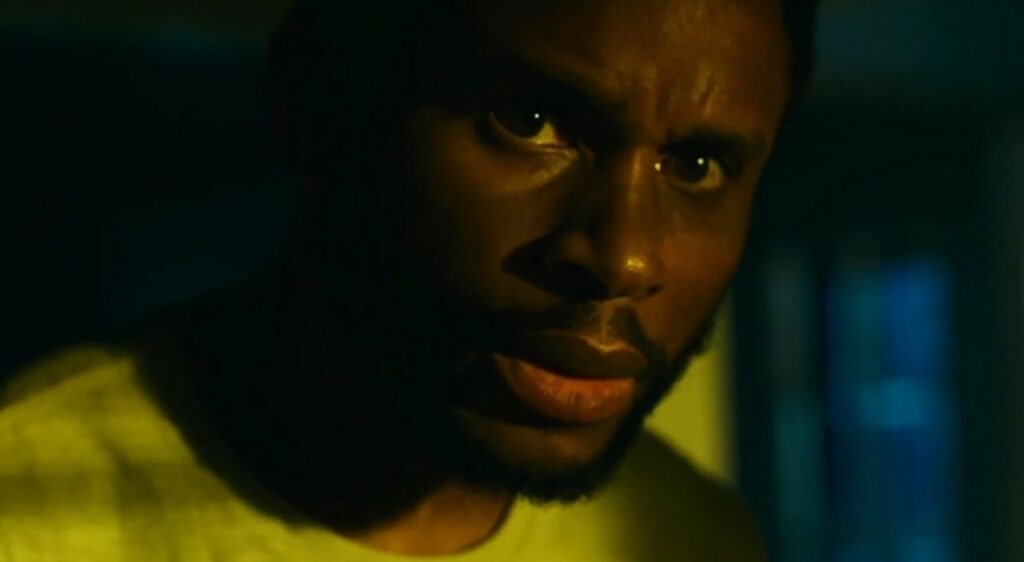Nnamdi Asomugha’s debut feature film, The Knife (2025), zeroes in on real-world fear through one tragic family night. Directed and written by Asomugha, who also stars as the film’s lead, The Knife doesn’t deal in effects work, bombastic moments, or shock value. Instead, it uses your own knowledge of situations, like what you’re watching unfold, to create something that continuously leaves you anxious.
In The Knife, we meet construction worker Chris (Asomugha) as he’s tending to small imperfections in his new home. The house is something that Chris takes immense pride in; it’s a symbol of providing a good life for his family. He has a wife, Alex (Aja Naomi King), and three daughters, Ryley (Aiden Gabrielle Price) and Kendra (Amari Alexis Price), one of whom is still an infant.
After the family settles in for the night, a loud noise wakes Chris up. When he gets up to investigate, he finds that the woman has broken into their home. It’s at this point that the audience is pulled out of the encounter. We’re taken to the girls’ rooms and to Alex, only to arrive back in the kitchen and see that the intruder is lying on the kitchen floor unconscious.
The intruder is an older woman, but more importantly, for a story fueled by exploring the question of how optics. Immediately, no one knows what to do. The family knows what the audience does. There’s an unconscious white woman on the floor in a Black family’s house, and the patriarch of the family was the only one who saw her while she was conscious.
What ensues at this point is a conversation that moves back and forth between the family. Anxiety grows, as does fear. Alex knows what this will look like and the danger that Chris is in, and unfortunately, so do their young daughters. One says that she’s scared about him talking to cops, and we all know what she means.
Nnamdi Asomugha keeps pulling the rug from under you in the simplest of ways.

Regardless, Chris calls 9-1-1, and when the police finally arrive, it goes just as you would expect it. When the lights in the driveway pull up, director Nnamdi Asomugha is deliberate in building fear in the room. Holding each other, they engage the police, their infant daughter still in her crib. And immediately they’re met with suspicion.
That suspicion, at first, lacks overt violence. Still, as the police question the family twice about everything, only to not believe them, the viewer starts to see the paths that this story can take. That drives our fear as much as theirs. While this isn’t a horror movie, it’s clear that the excessively suspicious men in blue bring dread to every scene. They move around the family like predators, and we all know how simple it is for this film to come to an ending right there.
As the cops find the intruder lying on the kitchen floor unconscious, a knife in her hand, Detective Carlsen (Melissa Leo) comes to the scene, focused on uncovering the truth about what happened. Under questioning, the family closes ranks, hoping to safeguard each other from the inevitable fallout. But as the audience learns about each subsequent choice the family makes, it drives them further into tragedy.
The Knife isn’t a bad movie; it’s just a movie that I can’t watch right now, and I don’t know if anyone who understands the danger of calling the police will want to. In reality, there are two kinds of people in this world. People who call the cops in an emergency and feel a sense of security in doing so, unworried that they will be accused of the crime they have called to report. And on the other side, there are people who, even when they’re the victims, when they’re in danger, understand that the cops will at best do nothing for them, and at worst harm them instead.
A muddled finale is the only thing that keeps this debut movie from being great.

If you don’t know that already, if you don’t live that, then The Knife can mostly teach you. However, from Alex’s decision to disturb the crime scene, and Chris’s struggles with addiction, there is an open path to take that instead makes the audience ask, “But why did you do that?” Or say, “It would have been okay if she just didn’t do that.” The window of casting guilt on the family for not being the perfect victims is too much in our current environment, and leaves the film too open for interpretation.
Ultimately, however, that isn’t the fault of the director. It’s the fault of his audience and the world we’re living in currently. The Knife showcases how unsafe Black families are, even when they’re the ones in need of help.
Running alongside that, the way that I have seen the fear of detention stop people in my community from reporting crimes committed against them, including intimate violence, is too much to bear. Why call the cops if they want you to be guilty, if they’re looking for a reason to shoot you, or if they’re looking for a reason to call in immigration agents, who are becoming a mainstay in many major cities?
The Knife succeeds by capturing tension and fear with very little. The movie takes time to show the family, and Asomugha, King, and the Price sisters deliver performances that leave you holding your breath. How close it hits home is unnerving in its way, but hopefully, it opens some people’s eyes to the reality that we are not protected by those who say they are here to do so. If the family’s performances don’t move you, I have a hard time knowing what will.
To the movie’s credit as well, casting Manny Jacinto as the cop looming over the family is impeccable. It would have been easy to have cast just white actors in the roles of the police; however, Jacinto’s performance highlights that anti-Blackness persists no matter what community they come from. As we look at real-world cases of police violence, that tracks.
There is not a single element of The Knife (2025) that allows you to relax.

The Knife is barely an hour and a half long, and yet, you feel every single minute. The choice to shoot the film in real-time is so smart, as the night makes you hold your breath. Every minute counts, every word spoken, and every choice. It’s terrifying in its own grounded way. While it may get lost in the weeds in its social commentary, particularly in giving the police justifications to keep being increasingly antagonistic, the effect it has on the viewer is complete discomfort.
While the performances move the narrative, it’s how the filmmaker uses this one location that once meant safety and destroys it as the family’s worst night of their lives. As the family is kept away from each other in different rooms, the cops storm their way through it all with disrespect dripping from their boots. All of it is so finely tuned as to make the audience grind their teeth.
This movie isn’t for me, or honestly, for anyone who won’t call the police for help. But that’s because it’s too real. If anything, my fear was ramped up by expecting the tragedy to spiral even more out of the family’s control. Every second of the interrogation, and even when Chris and Alex are just standing on the lawn with Jacinto’s Officer Padilla, staring them down, I was waiting for the other shoe to drop. For the gun to fire.
Reality is the tool that Asomugha uses to pull the tension tighter, each choice and answer building a snowball of consequences. While I don’t care for how we got to the ending or its implications, the film’s choice to unfold the final act the way it does ends an already anxious film on a note that sticks with you.
The Knife is now playing in theaters.
The Knife (2025)
-
Rating - 7/107/10
TL;DR
Reality is the tool that Asomugha uses to pull the tension tighter, each choice and answer building a snowball of consequences







